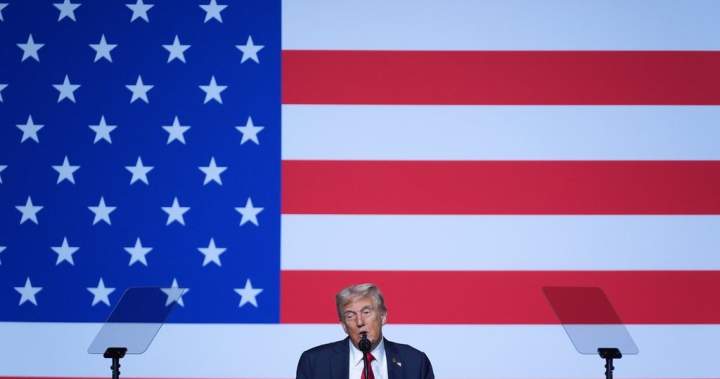Northern Canadians see U.S. President Donald Trump’s America as a greater threat to Canada’s Arctic security than Russia or China, as the region attracts greater attention from both polar and non-polar powers, according to recent polling.
The polling data comes as Canada’s foreign affairs minister is being warned that current tensions with Russia and China’s growing presence in the Far North is introducing a “high degree of uncertainty regarding the future of Arctic sovereignty.”
Polling released in September by L’Observatoire de la politique et de la sécurité de l’Arctique (OPSA), a Québec-based research center, found that a full 37 per cent of Northerners felt the United States is the “most serious threat” to Canada’s North, followed by Moscow (35 per cent) and Beijing (17 per cent).
“To see the U.S. as the number one threat, it’s quite alarming, quite surprising,” said Mathieu Landriault, OPSA’s director.
Landriault said the sentiment is particularly strong among respondents in Yukon, who share a border with Alaska, and in Nunavut, whose northern neighbour, Greenland, is facing repeated threats from the Trump administration.
“There’s that feeling that the U.S. now is a destabilizing force in the region, for sure,” Landriault added.
Trump’s tariffs, executive orders and his repeated rhetoric around making Canada the 51st state —which resurfaced this week in a rambling address to America’s military brass — have “significantly shifted the security landscape in the North,” OPSA noted in its findings.
While it was the first time OPSA polled Northerners on this question, the group noted their findings do not “bode well” for the future of Canada-U.S. cooperation in the North, given the administration “is now seen as a credible threat to Canada on par with a traditional foe like Russia.”
Get breaking National news
For news impacting Canada and around the world, sign up for breaking news alerts delivered directly to you when they happen.
Speaking to an unprecedented gathering of U.S. military leaders on Tuesday, Trump said he continues to pitch Canadian officials on the prospect of becoming an American state.
“Canada called me a couple of weeks ago, they want to be part of (the “Golden Dome” missile defence program), to which I said, ‘Well, why don’t you just join our country? You become 51 – become the 51st state — and you get it for free,” Trump said.
“So I don’t know if that made a big impact, but it does make a lot of sense.”
His comments about the annexation of Canada came just one week after his ambassador to the country, Pete Hoekstra, testily told a Calgary audience that “if you wanted talk about the ‘51st state,’ I’m sorry, I don’t have time to do that.”
Briefing materials prepared for Global Affairs Minister Anita Anand earlier this year make prominent mention of Arctic security. The documents note that while the region has been “cooperatively managed” by polar states “to foster a low-tension region free from military competition,” the situation in Canada’s North is rapidly changing.
Climate change, for instance, is opening up new potential transportation and shipping lanes, while competition for rare earth minerals has companies and governments looking north.
“International guardrails to prevent and resolve conflict have weakened and broader geopolitical considerations (e.g. Russia’s war against Ukraine … (and) increasing challenges from non-Arctic states to Arctic state primacy in Arctic governance) have had spillover effects in the Arctic.”
The documents suggest that collaborative efforts between Moscow and Beijing are increasingly looking north, and include air and sea patrols near Alaska, as well as regular scientific research by Chinese icebreakers in the Arctic Ocean.
Canada and its allies assume those Chinese vessels are up to more than just scientific research, the documents note.
Anand’s briefing materials warn that Northeners and Indigenous communities are also targeted by “adversaries” in disinformation and influence campaigns. The document doesn’t name the parties responsible, but Canada’s national security has repeatedly pointed to both China and Russia as proponents of those types of operations.
And Trump’s repeated talk of annexation could play directly into one of Moscow’s preferred narratives.
The NATO Strategic Communications Centre of Excellence, based in Riga, noted last year that Russia has “dramatically increased assertive rhetoric regarding the Arctic region,” particularly around warnings of heightened potential for military conflict.
A recent report from the University of Ottawa’s Information Integrity Lab noted that central to Moscow’s narrative is “the portrayal of NATO as a destabilizing force militarizing the Arctic.”
“Russian media consistently frame NATO’s Arctic presence as provocative, while casting Russia’s own military activities as routine and defensive,” the report added.
“In tandem, Russia has expanded its hybrid threat operations in the Arctic and surrounding areas, deploying disinformation, cyber attacks, and infrastructure sabotage to destabilize Western actors.”
Arctic security experts have noted that Russia pushes the narrative that Canada and its allies are simply pawns for Washington’s interests in the region. Trump’s fixation on annexation of both Canada and Greenland could reinforce that narrative, rather than dispel it.
The OPSA polling was conducted between May 8 and May 26, 2025, and randomly sampled 609 voting-aged Canadians living in Canada’s three northern territories. The results are considered accurate within 3.97 percentage points, 19 times out of 20.
© 2025 Global News, a division of Corus Entertainment Inc.
Northerners see Trump’s U.S. as greater threat to Arctic than Russia: poll


